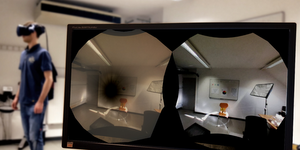Information
- Publication Type: Conference Paper
- Workgroup(s)/Project(s):
- Date: November 2020
- Open Access: yes
- Lecturer: Katharina Krösl
- Event: IEEE International Symposium on Mixed and Augmented Reality (ISMAR).
- Call for Papers: Call for Paper
- Booktitle: IEEE International Symposium on Mixed and Augmented Reality (ISMAR).
- Conference date: 9. November 2020 – 13. November 2020
- Pages: 1 – 10
Abstract
For our society to be more inclusive and accessible, the more than 2.2 billion people worldwide with limited vision should be considered more frequently in design decisions, such as architectural planning. To help architects in evaluating their designs and give medical per-sonnel some insight on how patients experience cataracts, we worked with ophthalmologists to develop the first medically-informed, pilot-studied simulation of cataracts in eye-tracked augmented reality (AR). To test our methodology and simulation, we conducted a pilot study with cataract patients between surgeries of their two cataract-affected eyes. Participants compared the vision of their corrected eye, viewing through simulated cataracts, to that of their still affected eye, viewing an unmodified AR view. In addition, we conducted remote experiments via video call, live adjusting our simulation and comparing it to related work, with participants who had cataract surgery a few months before. We present our findings and insights from these experiments and outline avenues for future work.Additional Files and Images
Weblinks
BibTeX
@inproceedings{Kroesl_2020_11_09,
title = "CatARact: Simulating Cataracts in Augmented Reality",
author = "Katharina Kr\"{o}sl and Carmine Elvezio and Laura R. Luidolt
and Matthias H\"{u}rbe and Sonja Karst and Steven Feiner and
Michael Wimmer",
year = "2020",
abstract = "For our society to be more inclusive and accessible, the
more than 2.2 billion people worldwide with limited vision
should be considered more frequently in design decisions,
such as architectural planning. To help architects in
evaluating their designs and give medical per-sonnel some
insight on how patients experience cataracts, we worked with
ophthalmologists to develop the first medically-informed,
pilot-studied simulation of cataracts in eye-tracked
augmented reality (AR). To test our methodology and
simulation, we conducted a pilot study with cataract
patients between surgeries of their two cataract-affected
eyes. Participants compared the vision of their corrected
eye, viewing through simulated cataracts, to that of their
still affected eye, viewing an unmodified AR view. In
addition, we conducted remote experiments via video call,
live adjusting our simulation and comparing it to related
work, with participants who had cataract surgery a few
months before. We present our findings and insights from
these experiments and outline avenues for future work.",
month = nov,
event = "IEEE International Symposium on Mixed and Augmented Reality
(ISMAR).",
booktitle = "IEEE International Symposium on Mixed and Augmented Reality
(ISMAR).",
pages = "1--10",
URL = "https://www.cg.tuwien.ac.at/research/publications/2020/Kroesl_2020_11_09/",
}


 Paper
Paper
